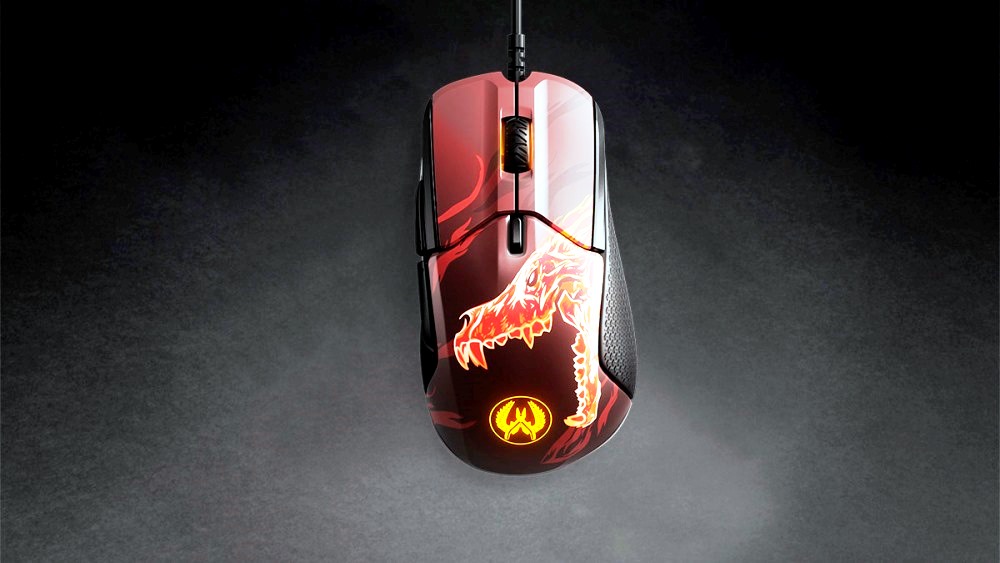
Choosing the right mouse for CS:GO (Counter-Strike: Global Offensive) largely depends on your personal preferences and playstyle.
However, there are a few key factors to consider when selecting a mouse for gaming:
- DPI and Sensitivity: DPI (dots per inch) refers to the mouse’s sensitivity. CS:GO is a game that requires precise aiming, so it’s essential to have a mouse with adjustable DPI settings. Most gaming mice offer DPI customization, allowing you to find the sensitivity that suits you best.
- Ergonomics: Look for a mouse that feels comfortable in your hand and supports your grip style. There are generally three types of grip styles: palm grip, claw grip, and fingertip grip. Different mice are designed with specific grip styles in mind, so choose one that matches your preference.
- Weight: Mouse weight can impact your gameplay. Some players prefer lightweight mice for faster movements, while others prefer heavier ones for more stability. Consider your preference and try out different weight options to find what feels most comfortable and precise for you.
- Button Configuration: CS:GO relies heavily on keyboard inputs, so having additional programmable buttons on your mouse can be advantageous. You can bind frequently used commands or actions to these buttons, improving your efficiency in the game. Decide how many programmable buttons you need based on your playstyle.
- Sensor Type: Optical sensors are generally more popular for gaming due to their accuracy and responsiveness. They provide consistent tracking and are less prone to acceleration issues. Laser sensors, while capable of higher DPI settings, may introduce slight acceleration and are more sensitive to surface textures.
Some popular gaming mouse brands known for their quality and performance include Logitech, Razer, SteelSeries, and Zowie. Specific models that are frequently recommended for CS:GO include the Logitech G Pro Wireless, Razer DeathAdder V2, SteelSeries Rival 600, and Zowie EC2.
Ultimately, the best mouse for CS:GO is subjective, and what works for one person may not suit another. It’s recommended to try different mice if possible or read reviews from other CS:GO players to get an idea of which mouse may be the best fit for you.

DPI and Sensitivity
DPI (dots per inch) and sensitivity are closely related when it comes to gaming mice. DPI refers to the sensitivity of the mouse, specifically how many pixels the cursor moves on the screen for each inch of physical movement. Sensitivity, on the other hand, is a setting within the game that determines how the mouse input translates to the in-game movement.
When setting up your mouse for CS:GO, it’s crucial to find a balance between DPI and in-game sensitivity that suits your playstyle and comfort level.
Here are some considerations:
- DPI Settings: Most gaming mice offer adjustable DPI settings, allowing you to customize the sensitivity to your preference. Lower DPI settings result in slower cursor movement, while higher DPI settings make the cursor move faster across the screen. It’s generally recommended to start with a lower DPI setting and adjust it gradually to find what feels comfortable and allows for precise aiming.
- In-Game Sensitivity: CS:GO provides an in-game sensitivity setting that determines how your mouse movements translate to your in-game crosshair movement. This setting is separate from your mouse’s DPI. Adjusting the in-game sensitivity can further fine-tune your aiming and responsiveness. As a starting point, it’s recommended to set the in-game sensitivity to a level where you can do a full 360-degree turn on your mousepad without having to lift your mouse.
Finding the right combination of DPI and in-game sensitivity is a matter of personal preference and experimentation. It’s generally advised to avoid extremely high sensitivity settings as they can make precise aiming more difficult. Aim for a sensitivity that allows you to make precise adjustments while still being able to turn comfortably and quickly when needed.
Remember that finding the right sensitivity takes time and practice. It’s recommended to make small adjustments and give yourself some time to adapt before making further changes. Additionally, consistency is important, so try to maintain the same DPI and sensitivity settings across different games to build muscle memory.
Ultimately, the best DPI and sensitivity settings for CS:GO will vary from player to player, so it’s important to experiment and find what works best for your individual playstyle.
Ergonomics
Ergonomics plays a significant role in gaming comfort and performance. A mouse that fits your hand well and supports your grip style can enhance your gameplay experience and reduce the risk of discomfort or fatigue during long gaming sessions.
Here are some key considerations for mouse ergonomics:
- Size and Shape: Choose a mouse that matches the size of your hand and provides a comfortable grip. Some mice are designed to be suitable for different hand sizes, offering options like small, medium, and large. Additionally, consider the shape of the mouse. Ergonomic shapes with contours that align with your hand’s natural curves can provide better support and reduce strain.
- Grip Style: Different players have different grip styles: palm grip, claw grip, and fingertip grip. Determine your preferred grip style and choose a mouse that accommodates it. For example, if you have a palm grip, look for a mouse with a larger, ergonomic shape that fills your hand. If you have a claw grip, consider a mouse with a shorter length and a higher arch. Fingertip grip users may prefer smaller and lighter mice.
- Button Placement: Take note of the mouse’s button placement and determine if it suits your needs. Some mice have additional programmable buttons that can be customized for in-game commands or macros. Ensure that these buttons are easily accessible without straining your fingers.
- Weight: Mouse weight is a personal preference and can affect your control and precision. Some players prefer lightweight mice for quick and effortless movements, while others prefer heavier mice for stability and accuracy. Consider your preferred weight and try out different options to find what feels most comfortable and natural for you.
- Material and Texture: The material and texture of the mouse can also impact comfort and grip. Look for a mouse that has a surface texture that feels comfortable to your touch. Some mice have rubberized coatings or textured grips to provide better control and prevent slipping.
When it comes to ergonomics, it’s best to try out different mice if possible or read reviews from other gamers with similar grip styles. Keep in mind that everyone’s hand size and preferences are different, so what works for others may not work for you. Prioritize your comfort and choose a mouse that allows you to play comfortably for extended periods without strain or discomfort.
Weight
The weight of a gaming mouse is an important consideration as it can affect your control, precision, and comfort during gameplay. Different players have different preferences when it comes to mouse weight, so it’s crucial to find a weight that suits your playstyle and feels comfortable to use.
Here are some factors to consider:
- Lightweight Mice: Lightweight mice are typically preferred by players who prioritize quick and agile movements. They allow for faster flick shots, quick repositioning, and less fatigue during long gaming sessions. Lighter mice are often popular among FPS players, including CS:GO, where quick reflexes and precise aim are crucial.
- Heavyweight Mice: Some players prefer heavier mice for improved stability and control. Heavy mice can provide a more consistent and steady feel, which may be beneficial for players who require precise tracking or favor slower, deliberate movements. They can also help reduce hand tremors for players with less steady hands.
- Adjustable Weight Systems: Many gaming mice come with adjustable weight systems that allow you to add or remove weights according to your preference. This feature gives you the flexibility to fine-tune the mouse’s weight to find the optimal balance for your playstyle. By experimenting with different weight configurations, you can find the sweet spot that suits your needs.
It’s important to note that there is no universally “correct” or “best” weight for a gaming mouse. The ideal weight is highly subjective and can vary from person to person based on hand size, grip style, and personal preference. Some players may find lightweight mice more comfortable and responsive, while others may prefer the added stability and heft of a heavier mouse.
To determine the right weight for you, consider your playstyle and try out different mice with varying weights if possible. Pay attention to how the mouse feels in your hand, how it tracks your movements, and how comfortable it is to use for extended periods. Ultimately, choosing a mouse with a weight that feels natural and comfortable to you will contribute to your overall gaming experience and performance.
Button Configuration
Button configuration is an important aspect to consider when choosing a gaming mouse for CS:GO. Having additional programmable buttons can provide you with shortcuts and quick access to in-game commands, giving you a competitive edge and improving your overall efficiency.
Here are some points to consider regarding button configuration:
- Number of Buttons: Determine how many extra buttons you would like on your mouse. Gaming mice can range from having just a couple of extra buttons to a more extensive array. The number of buttons you need depends on your playstyle, the specific commands you want to bind, and the complexity of your keybind setup.
- Placement and Accessibility: Consider the placement of the extra buttons on the mouse. Ensure they are positioned in a way that allows easy access without interfering with your grip or causing accidental clicks. Mice with buttons placed on the side, near the thumb, are commonly preferred as they are easily reachable without much finger movement.
- Programmability and Customization: Look for a mouse that provides software or onboard memory that allows you to customize and program the extra buttons. The ability to assign specific commands, macros, or even key combinations to the buttons gives you flexibility and control over your gameplay.
- Macro Functionality: Some gaming mice offer macro functionality, allowing you to record and assign complex sequences of commands to a single button press. This feature can be especially useful in CS:GO for executing specific actions or combinations of actions quickly and efficiently.
- Software and Profiles: Check if the mouse comes with software that allows you to create profiles and save button configurations for different games or scenarios. This way, you can easily switch between different setups based on your gaming needs.
Remember that while additional buttons can be advantageous, it’s crucial to avoid overcomplicating your setup. Too many buttons or complex configurations might lead to confusion or accidental inputs. It’s recommended to start with a few key bindings and gradually add more as you become comfortable.
Ultimately, the ideal button configuration depends on your personal preference and playstyle. Consider the commands you frequently use and find a mouse that offers the right balance of extra buttons, customization options, and accessibility to enhance your CS:GO gameplay.
Sensor Type
The sensor type of a gaming mouse is an important consideration when choosing a mouse for CS:GO. The sensor determines how the mouse tracks and translates your movements into on-screen cursor or crosshair movement.
There are two main types of sensors used in gaming mice: optical sensors and laser sensors.
- Optical Sensors: Optical sensors use an LED (Light-Emitting Diode) to track movement. They capture images of the surface beneath the mouse and determine the movement based on the changes in those images. Optical sensors provide accurate and consistent tracking, making them popular among gamers. They typically have lower latency and are less prone to issues like acceleration or jitter.
- Laser Sensors: Laser sensors use a laser beam to track movement. They work by capturing more data points per inch, which allows for higher DPI (dots per inch) settings. Laser sensors can provide very high sensitivity, but they may introduce slight acceleration or smoothing effects. They are generally more sensitive to surface textures and can have difficulty tracking on certain surfaces.
For CS:GO, optical sensors are commonly preferred due to their consistent and reliable tracking. The game requires precise aiming and quick reflexes, and optical sensors offer accurate and predictable cursor or crosshair movement. They are less likely to introduce unexpected cursor acceleration, which is important for maintaining consistency in your aim.
When choosing a gaming mouse, look for one that features a high-quality optical sensor with a high maximum DPI setting. Many reputable gaming mouse manufacturers offer mice with top-of-the-line optical sensors that deliver excellent tracking performance.
It’s worth noting that while sensor type is important, the specific model and implementation of the sensor can also impact its performance. It’s recommended to read reviews from trusted sources or gather feedback from other CS:GO players to ensure the mouse you choose has a sensor that meets your requirements for accurate and reliable tracking.
Which mouse is better wired or wireless?
The choice between a wired or wireless mouse depends on your personal preferences and specific needs.
Both options have their advantages and considerations. Let’s explore them:
Wired Mouse:
Advantages:
- Consistent Connection: Wired mice have a direct, wired connection to your computer, which ensures a stable and reliable connection without the possibility of signal interference or latency issues.
- No Battery Concerns: Since wired mice draw power directly from your computer, you don’t have to worry about battery life or recharging. This can be advantageous for extended gaming sessions or situations where you need uninterrupted usage.
Considerations:
- Limited Mobility: The primary drawback of wired mice is the limitation of movement caused by the cable. The cable can sometimes get in the way or create drag, especially if it’s not properly managed or if you have limited desk space.
- Portability: Wired mice require a physical connection to your computer, making them less convenient for travel or using with multiple devices.
Wireless Mouse:
Advantages:
- Freedom of Movement: Wireless mice provide greater freedom of movement since there is no cable to restrict your hand or mouse movement. This can be particularly beneficial for gamers who require wide mouse sweeps or prefer playing from a distance.
- Portability: Wireless mice are more portable and easier to carry around since they don’t rely on a physical connection. They can be used with laptops, gaming consoles, and other devices that support wireless connectivity.
Considerations:
- Battery Life and Charging: Wireless mice are powered by batteries, which means you need to consider battery life and occasionally recharge or replace batteries. However, many modern wireless mice have improved battery life and charging options.
- Latency and Interference: While wireless technology has improved significantly, there is still a possibility of minor latency or signal interference with wireless mice. However, for most gaming purposes, the latency is negligible and shouldn’t significantly impact gameplay.
In recent years, wireless technology has advanced to the point where wireless gaming mice can offer comparable performance to their wired counterparts. Professional gamers and competitive players often prefer wired mice for their stability and reliability, but wireless options have gained popularity due to their convenience and improved performance.
Ultimately, the choice between a wired or wireless mouse comes down to personal preference, considering factors like mobility, convenience, and whether you prioritize a consistent connection over freedom of movement. It’s recommended to try out both options if possible or consider the specific features and reviews of the mice you’re interested in to make an informed decision.
What is mouse response time
Mouse response time refers to the speed at which a mouse can send its input signal to the computer. It is commonly measured in milliseconds (ms) and represents the time it takes for the mouse’s movement or button press to be registered and reflected on the screen.
There are two main aspects to consider when discussing mouse response time:
- Polling Rate: The polling rate, often measured in hertz (Hz), indicates how frequently the mouse reports its position to the computer. A higher polling rate means that the mouse sends updates more frequently, resulting in faster response time. Common polling rates for gaming mice range from 125Hz to 1000Hz. A polling rate of 1000Hz means the mouse reports its position 1000 times per second, resulting in a response time of 1ms.
- Sensor and Processing Time: In addition to the polling rate, the sensor and internal processing of the mouse also contribute to the overall response time. The time it takes for the sensor to detect movement, process it, and transmit the signal to the computer can impact the overall response time. High-quality gaming mice are designed to minimize sensor and processing latency to provide faster and more accurate tracking.
Lower mouse response time is generally desirable in gaming, especially for fast-paced and competitive games like CS:GO. A faster response time can improve your ability to react quickly, aim accurately, and track movements smoothly.
It’s worth noting that the actual impact of mouse response time on gameplay can vary depending on individual factors such as skill level, game mechanics, and the player’s own perception. Many modern gaming mice offer response times in the range of 1ms or lower, which is generally considered sufficient for most gamers.
When selecting a gaming mouse, consider the mouse’s polling rate and its reputation for fast and accurate tracking. Look for mice that are specifically marketed as having low latency or high-performance sensors to ensure a faster response time.
However, it’s important to remember that while a faster mouse response time can provide an advantage, it’s not the sole determinant of gaming performance. Other factors such as accuracy, ergonomics, and personal comfort should also be taken into account when choosing a gaming mouse for CS:GO or any other game.
In terms of response time, which mouse is better wired or wireless?
In terms of response time, wired mice generally have a slight advantage over wireless mice. Wired mice offer a direct, physical connection to the computer, which results in faster and more consistent data transmission. This direct connection ensures minimal latency and near-instantaneous response time.
Wireless mice, on the other hand, rely on wireless technology to transmit data to the computer. While wireless technology has improved significantly over the years, there is still a small amount of latency introduced compared to wired mice. This latency is usually in the range of a few milliseconds, which is generally imperceptible for most users and does not significantly impact gameplay.
It’s important to note that the difference in response time between wired and wireless mice is minimal, and for the majority of gamers, it is unlikely to be a noticeable factor. Wireless technology has advanced to the point where modern gaming mice can offer response times that are comparable to their wired counterparts, especially when using high-quality wireless technologies like 2.4GHz or Bluetooth with high polling rates.
Moreover, some high-end wireless gaming mice now feature technologies specifically designed to minimize latency, such as adaptive frequency hopping or ultra-low latency modes. These advancements further bridge the gap between wired and wireless response times.
Ultimately, if you prioritize the absolute fastest response time, a wired mouse is still the optimal choice. However, for most gamers, the difference in response time between wired and wireless mice is negligible, and the convenience and freedom of movement offered by wireless mice can outweigh any minor latency introduced. It’s important to consider other factors such as comfort, ergonomics, and personal preference when choosing between a wired or wireless mouse.


